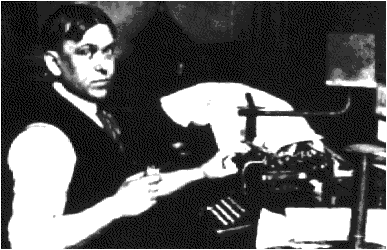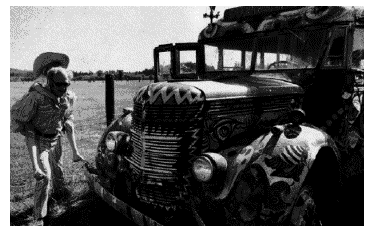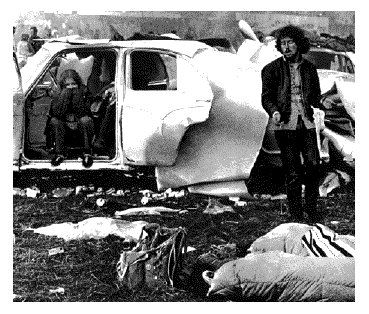America
S. T. Joshi, Editor
(Ohio University Press)

Readers who have never sampled Mencken would be well advised to spend some time with this volume. Certainly no other English critic since Samuel Johnson --- with the possible exception of George Bernard Shaw --- was able to integrate a love of bombast, an acute political sense, an encyclopaedic knowledge, a loathing for idiocy, and a scintillating vocabulary into a single, delicious whole.
specialists paraded in the newspapers --- one the tariff, on military affairs, on foreign relations, and so on. But the average congressman lifts himself to no such heights of sagacity. He is content to be led by the fugelmen and the bellwethers. Examine him at leisure, and you will find that he is incompetent and imbecile, and not only incompetent and imbecile, but also incurably dishonest... His intelligence is that of a country newspaper editor, or evangelical divine...
Fugelmen --- spelled "fuglemen" by Webster's --- refers to the soldier who stands before the others, showing them the ideal positions and stances. Bellwethers were the dominant sheep, fitted with a bell, who led the others in a flock.
Here is Mencken on rabble-rousers. Note the rhythms right out of Alexander Pope, especially the surprising triad that dissolves into yet another triad:
Jackson did convince the chandala that their betters were robbing them, and Bryan did convince them that the trusts were crucifying them, and Roosevelt did convince them there were vast, horrible and unintelligible conspiracies against them.
Mencken was especially adept at crystallizing in one sentence a combination of insult and wit that has never been eclipsed, certainly by his successors, the likes of Tom Wolfe, Warren Hinckle, Hunter Thompson. It's the surprise factor that most delights and pleases us old cynics, for instance, the ultimate word in this take on politics in this country:
The men of other nations, true enough, also have their national saturnalia, their occasional debauches of enthusiasm and rage, their orgies of hero worship and their butcheries of heroes following after, but is only in the United States that the body politic is chronically in this state of tumescence..."
Or this, nested in his essay on Manhattan:
All colossal accumulated wealth of the United States, the greatest robber nation in history, tends to force itself at least once a year through the narrow neck of the Manhattan funnel.
Or this, on the great journalist William A White, and his fellow Kansans:
They go to church, they avoid the wine-cup, they keep out of jail, they abhor the cigarette, they pursue the scarlet woman with staghounds, they are patriots, they have cement sidewalks in front of their houses, their children go to high school, they have money in the bank. But then it suddenly occurs to him that, at bottom, they are mere blobs, that they are blind to beauty and bare of charm, that they are an ignorant and ignoble people, that they don't know what joy is, that all their fundamental ideas are pathetically narrow, trivial, and sordid.
Note the almost poetic parallelisms --- "they avoid the wine-cup" (not "wine," but "the wine-cup"); "they abhor the cigarette," (not "cigarettes" but "the cigarette" --- as if there were only one); and the loveliest of them all, "they pursue the scarlet woman with staghounds" ("not with mere hounds, but with "staghounds" --- with all the overtures the added prefix brings in).
Mencken began as a newsman in the rough world of 19th century dailies --- he was a city room editor by age 23 --- and his prose shows the clarity learned in this profession. At the same time, he is crusty and opinionated: he loathes injustice, prohibition, Puritans, Methodists, Baptists and folly. He is all for the literate, the cynical; he delights in the idiocy of the Comstocks, the Anti-Saloon League, the Ku Klux Klan, and the evangelicals.
He also delights in the American language. It is the subject of one of his books, and gets a wonderful chapter here. This includes affection for such Americanisms as "threwn" (perfect participle of "throw,") "kep" (for "keep,") "fitten" (for "fight,") and "herd" for ("hear.") Too, he revels in the music of the language of the people:
There is the obvious tendency to heighten the effectiveness of speech by substituting harsh, brassy vowels for soft ones, as in the use of stang, swang, slang, and flang.
Mencken had a weakness for Maryland in general and Baltimore in particular --- places he chose to live out his life. He also had a special affection for San Francisco and a distaste for Los Angeles. In 1925, he wrote that San Francisco
has returned to its more spacious and urban life. It is agreeably wet, sinful, and happy. A civilized traveler may visit it today without running any risk of being thrown into jail or ducked in a baptismal tank. ... The rise of Los Angeles, indeed, has been a godsend to the whole San Francisco region, though the San Franciscans once viewed it with alarm. It has drawn off the middle western morons who flock to the coast, and concentrated them in the south. Their weather down there is warmer --- an important consideration to farmers who have been chillblained and petrified by the long, harsh winters of Iowa. And more attention is paid to the perils of the soul --- always an important matter to agronomists. In San Francisco there seems to be very little active fear of hell. The unpleasantness of roasting forever is sometimes politely discussed, but no one seems to get into a lather about it ... In Los Angeles the hell question is always to the fore, and so the yokels find the place more to their taste. There are more than 10,000 evangelists in the town, all of them in constant eruption.
The wonder of Mencken is amply shown here. Jail and the baptismal tank are somehow merged. Farmers have been "chillblained and petrified" --- words equally felicitous in referring to their physical selves and their minds. They are referred to, not simply as "yokels" but as "agronomists," for whom "the perils of the soul" are always important. Evangelists are not preaching, they are "erupting." Such happy choice of words shows the master at his best.
I fell in with Mencken many years ago in college, and I have been stuck since. Only a few of the cynical masters of my youth can still raise a laugh. George Ade, Robert Benchley, and Philip Wylie no longer can get a rise out of me. Only Mencken and Perelman and, on occasion, E. B. White are able to bridge the mountain of years since my sophomore days in college.
Go to further readings from H. L. Mencken.
The Spanish-American War
And Military Medicine
Vincent J. Cirillo
(Rutgers University Press)

But the reality of it was more odoriferous. Reporters of the time recalled dysentery --- "the Tennessee quickstep" --- millions of flies, and the astonishing stink of thousands of men, in close company, men who had never been taught the rudiments of sanitation; who, in other words, saw every hill, tree, or bush as a privy. One General in the Civil War had referred to the vile odors as "inseparable from the army ... it might properly be called the patriotic odor."
Army sewage studies later determined that sixty thousand men discharge an average of 9.4 tons of feces and twenty-one thousand gallons of urine a day.
For instance, after a visit to a field hospital, in 10 August 1898 a reporter from the New York Times wrote,
The man was ill of typhoid fever, and his temperature was far above one hundred. When I reached his cot I nearly staggered with horror. The man's face was literally black with flies. His mouth, which was open --- the poor fellow was too weak to close it --- was filled with flies ... In another case a man who died in the division hospital was found to be literally alive with maggots under his armpits, and his dying agonies were intensified by the movements of these vermin.
The main causes of mortality were yellow fever, typhoid fever, malaria and dysentery, but in the later stages of the Spanish-American war in the Philippines, troops had to contend with cholera, yaws, leprosy, filariasis, dengue, and beriberi.
The author cites several "outcomes of the war," including the activation of an Army Nurse Corps, the well-researched report of the Yellow Fever Board, the activation of the Tropical Diseases Board, the inauguration of Antityphoid Inoculations, and the establishment of several schools of Medical Education in military camps.
Cirillo is no great shakes as a writer, but the facts give a certain power to the narrative. By drawing on the morbidity figures from the American Civil War, the Spanish-American War, and the Boer War --- he proves that the deaths of thousands of young men (and in the Boer War, women and children placed in concentration camps) forced the military in England and the United States to institute preventative measures to protect troops in future conflicts.
One of the most salient facts of their success --- "the elegant, foolproof work of the Yellow Fever Board" --- is buried in the text of page 119. It tells in a few words how improved sanitation dictated changes in American foreign policy:
The U. S. campaign to eradicate yellow fever from the Canal Zone was not wholly altruistic. Building the Panama Canal had gained political urgency in the aftermath of the Spanish-American War, because of the territory the United States had acquired in the Caribbean and Pacific.
And, then, in what might be considered one of the understatements of the ages: The eradication of Yellow Fever,
one of the greatest triumphs of scientific medicine, made possible the U. S. expansion of its overseas empire.
An American Childhood
<Micah Perks
(Counterpoint)

Their ten or so years on the commune were both typical (free love, funny clothes, unusual methods of teaching, freedom for the children) and atypical: genuine suffering in the winters and spring; cold, ice, snow, blackflies; drugs played down, (or, perhaps, not emphasized in this book); parents working with children at genuine risk --- some of the young men and women were placed at Valley Commune School by the courts.
The interest here is how a child will grow and develop in such a random environment. Micah says that "it was the best part of my life" but then immediately undercuts that with "best is not quite accurate, but I don't know what other words to use."
There were dozens of disasters or near-disasters --- but we are not convinced they were any better or worse than those that came to the rest of us as we were growing up. The main lodge burns down one night --- rumor is that Micah's father did it for the insurance. There are tumbles in frozen waters, people falling headfirst off horses, buses going off the road and into icy rivers. But one gets a feeling of a natural protectiveness. When a young man is sent up by the courts, sitting and talking to her father, abruptly
my father pulls a butcher knife out of a kitchen drawer. He tests it on his thumb. Then he walks up to Doug and slashes the sleeve on his down jacket. A baggy of pills falls out ... The valley is drug-free, me boy, Dad says.
There are battles between the various members of the commune about ownership of the land, or who is sleeping with whom --- but, always, there is a bell you can ring to call a meeting and do the no-holds- Dad ends up being the most fascinating character here, a man "who traces his true ancestry to the Celts." When he dies, "He wishes to be painted blue and bent into the lotus position before rigor mortis sets in." Towards the end of Micah's tale he goes off to join guru Rinpoche in Colorado, then, ends up on the east coast working as "an English butler" for rich WASPS. With his childish battles and games, his astute ways of handling the problems of the commune, even through Micah's distorted, somewhat dark lenses, Father comes off as being funny, fascinating, an accented charmer, who uses --- as most of will us use --- various tricks to get what he wants. Micah Perks ends up, thus, sounding like a stick-in-the mud. She certainly didn't inherent the old man's jokeish madness, nor her mother's easy tolerance. Rather, we end up seeing her --- in Samuel Johnson's famous line --- as a bit of a prig. In her writing, she does not know how to get a laugh out of some of the improbable situations that turn up in the book: people finding other people in bed with their husbands and wives, the reaction of the townspeople to this motley crew coming in for a free dinner, the mock battles that ran up and down the hills of the school. Pagan Time is delivered in the present tense, with all the weaknesses (an ersatz breathlessness) that is inherent with that style. The capper --- and to this reader, the best part of the book --- is the last chapter. Micah shows the manuscript around, to mother, father, sister and a few others, to get their reaction. We've just read it all, and now we can hear mother, father, sister reacting to her take on it all, their reaction to the way she has manipulated their images --- and manipulate, it turns out, is the best word to describe Micah and her book.
Mother, ever elegant, only complains about the passage that has her wiping her nose on a bedspread. I would never do that. I always use tissues. The bedspread. That's disgusting. Sister Beky, turned quite tart now, says "You're lucky you didn't make me into a whining little victim in that memoir." And father --- that madcap from so long ago: when she comes to visit, he talks of Rinpoche, he tells Micah's husband who "cooks well, keeps an orderly home: If you leave Micah ... come live with me. Micah says sourly, "he has reinvented himself all over again" --- but he comes across as someone we would want to hang out with, then and now. Dad says, in contrast to Micah's tale of the fire, "I didn't burn down the main house." No? The author --- ever the manipulator --- admits a page later that she did it. "It was me all the time." And then, to prove she's a trickster, probably a worse trickster than her old man: I don't believe it, either, not quite. You see, there are rules to this. Aren't there? At this stage, we can't be too sure. Still, underneath the narrative there is the powerful feeling that Micah doesn't care for him and his ways at all. Dad may a regular charmer --- but in the hands of the narrator, he comes off as a bit of a charlatan, definitely not to be trusted.
Still, underneath the narrative there is the powerful feeling that Micah doesn't care for him and his ways at all. Dad may a regular charmer --- but in the hands of the narrator, he comes off as a bit of a charlatan, definitely not to be trusted.